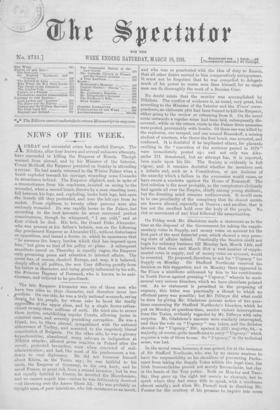On Friday week Mr. Gladstone made a statement as to
the time at the disposal of the Government for taking the supple- mentary votes in Supply, and money votes on account for the first part of the next financial year, which showed a very press- ing state of affairs indeed, Practically the Session could not begin for ordinary business till Monday last, March 14th, and between that time and March 21st a vast number of supple- mental votes in supply, and of money votes on account, would be essential. He proposed, therefore, to ask for "Urgency " for Supply on Monday. Sir Stafford Northcote reserved his decision on this suggestion, and on Monday there appeared iu the Times a manifesto addressed by him to his constituents in North Devon against granting " Urgency," wherein he made several very serious blunders, which we have elsewhere pointed out. As no statement is permitted in the proposing of urgency, this letter was practically a thrust to which no effectual parry was possible; but Mr. Dillwyn did what could be done by giving Mr. Gladstone private notice of five ques- tions concerning Sir Stafford Northcote's blunders, which he put on Monday at question-time, amidst violent interruptions from the Tories, evidently regarded by Mr. Dillwyn with calm surprise. Mr. Gladstone's answers were similarly interrupted, and then the vote on " Urgency " was taken, and the division showed—for " Urgency," 296 ; against it, 212 ; majority, 84,—a majority, of course, quite insufficient to carry " Urgency," which requires a vote of three to one. So " Urgency," iu the technical sense, was lost.


































